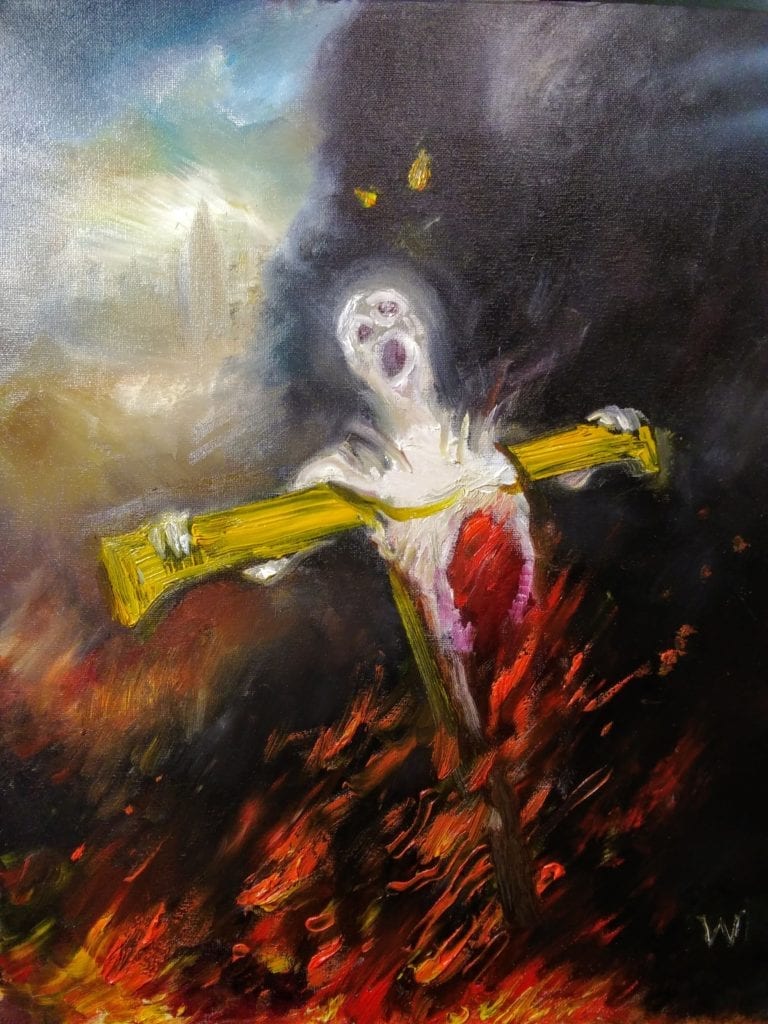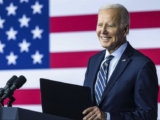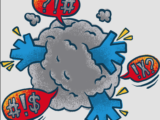“In the end, we will remember not the words of our enemies, but the silence of our friends.” – Dr. Martin Luther King, Jr.
Part II: Case Studies — Donald Trump and George Wallace –

New American Journal graphic by Walter Simon [Art Market Place]
“He who does not oppose evil, commands it to be done,” the great artist Leonardo Da Vinci once said.
By Glynn Wilson –
There would be no Donald Trump without George Wallace, two American politicians who used existential anxiety to create authoritarian regimes.
To understand the Trump phenomenon, how he “cheated” as a selfish actor, as scientists would say, how he used key words and phrases on Twitter and TV as effective propaganda techniques to give rise to this existential anxiety we are seeing across the land, which creates the necessary condition for him to become the authoritarian dictator he is, one need only look back to the events of the 1960s in Alabama.
There’s no doubt Trump’s brain trust, which includes Steve Bannon, have studied that era for lessons on how to manipulate the masses for their political ends.
The historian C. Vann Woodward once described Alabama as the closest thing to a totalitarian state in the United States under four-term Governor George C. Wallace. He opportunistically used the existential anxiety of the state’s white, Christian population, their fear of growing power on the part of African Americans involved in the Civil Rights Movement, to put him into power where he ruled a spoils system with nearly absolute control over who worked and who died.
“If you wanted to create a fascist regime, create existential anxiety. You’ve got the conditions for it,” says Joe Brewer, Founder and Executive Director at the Center for Applied Cultural Evolution. “It’s not difficult to diminish people’s emotional regulation and psychological flexibility, which makes them reactionary, judgmental, fundamentalist and all that.”
He pointed me to the research of Carole Ember, a cultural anthropologist at Yale University.
A person or group of people may feel existential anxiety when their group in society is involved in wars, they face natural disasters, earthquakes, tsunamis, or other perceived threats about the existence of their social group, like racial or religious conflicts.
“Climate change could create the perfect storm,” he says.
According to social scientists, Brewer said, this creates “the perfect condition for festering authoritarian regimes, fascism and fundamentalism.”
An increase in authoritarian leaders is predicted by this research, which is correlational work and does not prove cause, although experts are hard at work looking at the causal mechanisms to try to make sense of it.
“It’s a lot easier to radicalize people like the way Mussolini did during the populist uprisings after World War I in Italy,” Brewer said.
White Nationalism
Think of the so-called white nationalists in Charlottesville, and all those who agreed with them on Facebook or even in private. They support Trump, because he has not just blown the racial dog whistle call to wake up the Ku Klux Klan. He has poured gas on every fire he could find, with groups of people who are upset, angry or disgruntled with anything about their lives and the world they see.
Those people and groups have been carefully and strategically identified using the most expensive and sophisticated social media spying techniques ever devised by man or computer. Remember all the data mined from Facebook by Cambridge Analytica? It was never destroyed. They just changed the name of the company and moved it to a different super computer owned by libertarian billionaire Robert Mercer.
“People think Donald Trump is dumb,” Brewer said. “They thought George W. Bush was dumb. He was someone the average Joe thought they could sit down with and have a beer.”
We know a thing or two in Alabama about the crafty politician who acts like a country bumpkin in public to get the working class boys to vote for them. We had Howell Heflin who was so smart they called him “The Judge” in the United States Senate. But in his television commercials and on the campaign trail on the backroads of rural Alabama, he could wear blue jean coveralls and talk cotton with farmers and iron with steel workers like nobody’s business.
George W. Bush may have come off as a C-student frat boy for the cameras, but the powers behind him “created the most successful, powerful neo-conservative organization in the history of humanity,” Brewer says. “Those people weren’t dumb. They were brilliant.”
George Wallace may not have been brilliant, but he had a powerful political instinct and he knew the existential anxiety of his people. And he knew how to turn it into votes and power.
Historical Evidence
Dan T. Carter, a historian and Wallace biographer, wrote about this in the New York Times a year before Trump was sworn in as president.
What Donald Trump Owes George Wallace
“What both share is the demagogue’s instinctive ability to tap into the fear and anger that regularly erupts in American politics,” he wrote.
On paper Wallace’s speeches were not that great, “stunningly disconnected, at times incoherent,” he said — just like Trump’s.
Liberals, Democrats and intellectuals see these speeches as incoherent idiocy, myself included, yet many still share them on Facebook thinking they are exposing the lies. All that does is promote them in the Facebook popularity algorithm, fooling the computers and the fools at Facebook into thinking people are “liking” this nonsense. People with lower IQs under the spell of existential anxiety only see a savior they can’t quite understand, but feel that he is the leader of their tribe and by God on their side.
Videotapes of those Wallace rallies captured something of a circus performance, a show the press and media could not resist, just like Trump’s performances, a charlatan’s pitch right out of a Mark Twain novel.
“A wild energy seemed to flow back and forth between Mr. Wallace and his audience as he called out their mutual enemies: bearded hippies, pornographers, sophisticated intellectuals who mocked God, traitorous anti-Vietnam War protesters, welfare bums, cowardly politicians and ‘pointy-head college professors who can’t even park a bicycle straight,” Carter says.
The spectacle became irresistible for the television networks, he said, particularly since rallies often erupted into violent chair-throwing confrontations between Wallace’s supporters and angry demonstrators.
Even Rolling Stone National Affairs Desk writer Hunter S. Thompson understood that Wallace’s followers were not interested in position papers on banking regulations or the pros and cons of thermal energy.
Watching the Alabama governor perform was awe-inspiring to the gonzo journalist, who likened the rallies to a Janis Joplin concert “in which the bastard had somehow levitated himself and was hovering over us.â€
A year after Trump was sworn in, another writer for the New York Times wrote about Trump and Wallace again.
George Wallace Tapped Into Racial Fear. Decades Later, Its Force Remains Potent.
“Separated by as much as half a century, the two men’s public lives run strikingly parallel,” according to Clyde Haberman. “It’s as if they drank from the same political cup: George C. Wallace, the Alabama governor who ached to become president, and Donald J. Trump, the developer and showman who made it to the top. They are bound by their streaks of opportunism and by their campaigns tailored to resentful voters brimming with the conviction that society’s deck is stacked against them.”
Wallace is best remembered for his fierce opposition to racial integration in schools and “busing.” He lost a campaign for governor in 1958 espousing relatively tolerant views on race, but after he lost that race, he vowed not to be out segregated or “out niggered” ever again, according to Time magazine.
In January 1963, in his first inaugural address, Wallace pledged to protect “the great Anglo-Saxon Southland” with the battle cry: “Segregation now, segregation tomorrow and segregation forever.”
Five months later, “in an exercise that was more stagecraft than true resistance,” according to the Times, “he made a futile ‘stand in the schoolhouse door’ to keep two black students from enrolling in the University of Alabama.”
Wallace’s appeal to white working-class men and women extended beyond the state’s boundaries and the issue of race. He ran for president in 1964, 1968, 1972 and 1976, and found support in the industrial Midwest, where factories were closing and populations were migrating south and west. This was the very region that gave Trump his surprising victory in 2016 when African American men did not show up at the polls in places like Minneapolis and Detroit to vote for the woman Democrat, Hillary Clinton.
The two men fired up crowds in similar fashion. Both appealed to “forgotten†Americans, “stoking fear and loathing of ‘the other’ — blacks in Mr. Wallace’s case, immigrants … in Mr. Trump’s.”
The message from both was that a “nefarious other, enabled by a bumbling government, was stealing work and wealth from upright Americans.”
“Wallace understood that there were people who were hurting, struggling, losing jobs,†B. Drummond Ayres Jr., who long covered the South for The Times, said. “He tapped into that and appealed to that, because folks that are struggling often feel put upon.â€
Wallace demonized the federal government as an oppressor trampling on states’ rights. Trump denounced Washington as “the swamp†and its bureaucracy as a malevolent “deep state.â€
Wallace told listeners in 1968 that they had been treated like “a doormat long enough.†Trump said when he declared his candidacy that the United States had become “a dumping ground for everybody else’s problems.â€
Wallace sneered at the press, often singling out The Times for special scorn. Trump can hardly pass up a Twitter opportunity to rail about “fake news,†especially in the “failing†Times. He has gone so far as to call the news media in general an “enemy of the American people.â€
In speeches, both took delight in belittling people. Wallace made rhetorical pin cushions of “pointy-head college professors who can’t even park a bicycle straight.†At one of his rallies, he called out to a longhaired male protester, “Oh, I thought you were a she.†Trump has yet to meet a demeaning adjective he doesn’t like, with his “Crooked Hillary,†“Lyin’ Ted,†“Liddle Bob Corker†and other insults.
Both exhorted audiences to get physically rough with hecklers. Both called for certain malefactors to be put to death.
“Bam, shoot ’em dead on the spot!†Wallace said in 1968, referring to those rioting in America’s cities. Trump said drug dealers should be executed.
The two men even had similar speech mannerisms, often saying the exact same sentence twice in rapid succession.
For a short time back in Wallace’s day, another time of social upheaval and existential anxiety, it looked like he actually might have a chance to make a serious run at the presidency. In 1968, he ran one of the two best independent campaigns for president in U.S. history on the American Independent Party ticket. He managed to capture 13.5 percent of the popular vote, along with 45 electoral votes of five southern states — Alabama, Arkansas, Georgia, Louisiana and Mississippi — plus a “faithless elector†in North Carolina, a state won by Richard M. Nixon.
Only Teddy Roosevelt Roosevelt received more electoral votes running on the Progressive Party ticket in 1912. He won 88 electoral votes, and 27 percent of the popular vote.
In 1972, Wallace seemed to have a chance at the Democratic Party’s presidential nomination, until he was seriously wounded by a would-be assassin’s bullets at a campaign stop in Laurel, Maryland. From then on, he lived out his life in a wheelchair in constant pain.
He went on to repent and get elected governor again, but he will never be forgotten for the race baiting dictator he was.
Trump will never repent, never say he’s sorry. His narcissism personality disorder is so great that it’s not hard to imagine him being the crazy dictator to threaten to blow up the world with nuclear weapons. For more than half a century, we’ve feared that from other nut job dictators in North Korea and elsewhere.
This rooster has finally come home to roost here in the United States of America, and the world is growing more fearful of him every day. If we don’t take him out, they may try it. Iran has an $80 million price tag on his head, and the suicide bombers to do it for their families.
A Spoils System
As a newspaper reporter, I covered Wallace after he won the governor’s race again in 1982, so I witnessed the authoritarian regime at work first hand. It was a spoils system, as in “to the victor go the spoils” after a war, or an election.
In politics and government, a spoils system (also known as a patronage system) is a practice in which a political party, after winning an election, gives government civil service jobs to its supporters, friends, and relatives as a reward for working toward victory, and as an incentive to keep working for the party. This is opposed to a merit system, where offices are awarded on the basis of some measure of qualifications, independent of political spoils.
The truly sad part is that the Wallace spoils system was never dismantled after he “climbed his last political mountain” and stepped down in 1986. It was just picked up by the Alabama Republican Party, which is assisted in continuing this system by rich trial lawyers, rank and file union members, and every environmentalist who is afraid to speak out for fear of reprisal.
“Each time a man stands up for an ideal, or acts to improve the lot of others, or strikes out against injustice, he sends forth a tiny ripple of hope,†Robert F. Kennedy once said.
“The world is a dangerous place, not because of those who do evil, but because of those who look on and do nothing,” scientist Albert Einstein once said.
Now that we have set the stage, let’s get to the psychoanalysis of authoritarianism and dictatorship.
From all the research I have conducted on this subject, Evolutionary Psychologist Michael Schreiner describes it best.
“Times of uncertainty are the fertile soil in which the seed of authoritarianism sprouts, grows, and flourishes,” Schreiner says. “In the midst of social upheaval, where traditional norms and values have begun to unravel, where the long taken for granted social order seems to be disintegrating, existential anxiety skyrockets and irrational, destructive underlying drives and motivations which previously lay dormant awaken and demand release.”
Authoritarianism serves as a balm for painful anxiety and simultaneously allows for the safe release of irrational destructive drives, he says.
“Previously taboo thoughts and feelings are sanctioned by the authoritarian leader, are echoed by the authoritarian leader. People gripped by painful, hard to understand existential anxiety find relief by aligning themselves with the strong leader who promises to take care of everything for them if they simply surrender their own human powers, their own capacity for critical thought, their individual freedom.”
Of course as long as they consider themselves to be the ‘in group’, to be more or less the ‘same’ as the authoritarian leadership, it doesn’t feel to them like they’re surrendering freedom at all. They actually believe their freedom is being increased, to say whatever selfish things they feel like saying, abandoning all altruism toward their fellow human beings of other races, genders or sexual orientation.
USA, USA
I witnessed seeing them chant “USA, USA” in Bryant-Denny stadium this past fall, at the Alabama-LSU game Trump attended. He stood in the skybox and waved to the crowd like not just an authoritarian dictator or king, but like a divine Roman Emperor, a God.
“They have the freedom to think, say, and enact all those destructive impulses that used to be considered taboo, considered wrong,” Schreiner says. “Things they secretly believed but would never say due to possible bad consequences become sanctioned or even glorified by those in leadership positions and they luxuriate in their newfound capacity to unburden themselves of all of that irrational psychic material.”
A huge piece of this unburdening always comes in the form of scapegoating various vulnerable subsets of the population, he explains.
“We have to remember that anxiety is at the very center of the rise of authoritarianism, anxiety is the root,” he says. “This existential anxiety is the free floating, menacing sense at the edge of conscious awareness that something is ‘wrong’, that there’s some threat which must be addressed. Scapegoating this or that vulnerable group, placing the blame on that group for society’s ills and by extension one’s personal ills, provides an easy to define object for that hard to define existential anxiety to land on.”
Authoritarians and the followers who shelter under them only respect power and are repulsed by weakness.
“The irony in the case of the followers of authoritarianism is that in order to align with the powerful presence they must surrender their own human powers of reason, their capacity to see below the surface of things, their ability to think for themselves, their compassion. They become parrots of the authoritarian leader, they blindly believe whatever this leader says without analyzing it, they cast aside their old norms and values for whatever the stated norms and values of the leader are. These stated norms and values can change over time yet followers will have no problem adjusting to them. This is because the engine driving authoritarianism is not and never was reason, logic, or rational thought but rather the desperate need to reduce painful existential anxiety along with the pleasure in releasing irrational underlying drives.”
The rise of authoritarianism “necessarily” means the reduced capacity for independent, rational thinking. That would not only hinder the continued release of irrational drives and motivations but would also hinder the leader’s continued ability to dominate and control the masses.
“For the authoritarian, obedience is the great virtue and disobedience the great vice,” he says.
This obedience might be motivated by fear, love, a cult of personality, the prospect of material, emotional, or psychological gain, or over arguments for “law and order” or “God’s law.”
“Behavior is no longer determined by the individual’s chosen life ethic but by whether or not the powerful leader sanctions it. The content of the dictate is no longer judged ‘good’ or ‘bad’ but rather obedience to it is ‘good’ and disobedience ‘bad’.”
It is a great cultural irony that those most caught up in the sway of authoritarianism are those who cry loudest about “freedom.”
They wave their flags and symbols and call themselves true patriots.
“Yet underneath it all,” Schreiner concludes, “it becomes obvious that what they are really demanding is submission to their way of thinking.”
Existential Dread
There are other theories about Trump’s tactics and success.
Sheldon Solomon, an immigrant from Russia and a professor of psychology at Skidmore College in Saratoga Springs, New York, also co-author with Jeff Greenberg and Tom Pyszczynski of The Worm at the Core: On the Role of Death in Life, has conducted experiments showing subjects responding to an authoritarian personality like Trump based on messages that send psychological cues to the brain, stoking a fear of death.
The secret to Trump’s success? It’s sheer existential dread
In a recent experiment, American participants were asked: “Please describe the emotions that the thought of your own death arouses in you†and “Write down as specifically as you can what you think will happen to you physically as you die and once you are dead.â€
Moments later, those who had been asked to contemplate their mortality reported more negative attitudes towards immigrants, greater opposition to a mosque being built in their neighborhood, and a greater likelihood of voting for Donald Trump for president.
What could possibly explain these findings?
In The Denial of Death (1973), cultural anthropologist Ernest Becker argued that while humans share a basic biological predisposition towards self-preservation with all life forms, we are unique in our capacity for symbolic thought, including self-awareness. This gives rise to the unsettling realization that death is inevitable, can occur at any time, and that “we are ultimately no more significant or enduring than turtles or turnips.”
“The unvarnished awareness of death engenders potentially debilitating existential terror, which humans manage by embracing cultural world-views – for example, a religious identity such as Christianity, or a national identity such as ‘Englishness’. These world-views confer a sense that one is a person of value in a world of meaning, and hence eligible for immortality (either literally, through the heavens, afterlives and souls central to most religions; or symbolically, by being a member of a great and enduring tribe or nation, having children, amassing great fortunes or producing noteworthy works of art or science).”
People are therefore highly motivated to maintain faith in their cultural worldview as a psychological bulwark against existential dread, he says.
Becker then argued that because cultural world-views are essentially symbolic, they can never completely overcome the terror of death. There is always residual death anxiety, a “rumble of panic†underneath everything. This free-floating panic settles on to those we regard as different to ourselves, as possible threats. Having assumed material form, this fear can at least be managed: in our minds these people become repositories of evil. They are then denigrated, demonized, dehumanized and, in some cases, destroyed.
“Immigrants, including those who practice different religions, such as Muslims and Jews, have historically served as these scapegoats, as living embodiments of our existential dread,” he said.
Experiments carried out under the rubric of “terror management theory†corroborate Becker’s account.
They illuminate the existential underpinnings of hostility and disdain toward designated out-groups. After being reminded of their mortality (by answering the questions above, being interviewed in front of a funeral parlor, or subliminally exposed to the word “deathâ€), Christians had more favorable impressions of other Christians and more negative impressions of Jews; Germans sat closer to Germans and further away from Turkish immigrants; Iranians were more supportive of suicide bombings; and Americans advocated using nuclear, chemical and biological weapons against countries that posed no direct threat to the U.S.
After being reminded of their mortality Christians had more favorable impressions of other Christians and more negative impressions of Jews.
But how can these ideas help explain why death reminders increase support for Trump?
The German sociologist Max Weber theorized that in times of historical upheaval, when existential anxieties are salient, people embrace charismatic political leaders. In 1951, moral philosopher Eric Hoffer, in The True Believer: Thoughts on the Nature of Mass Movements, added that the primary impetus for populist movements is economic and psychological insecurity, leaving people “in desperate need of something … to live forâ€.
Authoritarian populist leaders, Hoffer argued, need not be intelligent or original.
Rather, the primary qualifications “seem to be: audacity and a joy in defiance; an iron will; a fanatical conviction that he is in possession of the one and only truth; faith in his destiny and luck; a capacity for passionate hatred; contempt for the present; a cunning estimate of human nature; a delight in symbols (spectacles and ceremonials) … the arrogant gesture, the complete disregard of the opinion of others, the singlehanded defiance of the world … [and] some deliberate misrepresentation of factsâ€.
They transform followers’ fears into rage and righteous indignation directed toward designated out-groups for political purposes.
For example, Trump campaigned for president by inflaming animosity towards Mexicans and Muslims. After the 2016 election, Trump admitted in calls to then Mexican president Enrique Peña Nieto that Mexico needed to pay for the wall to fulfill his campaign promise, and to Malcolm Turnbull, then prime minister of Australia, that he would “look foolish†if he honored a previous agreement to allow refugees to come to the U.S.
Studies confirm that mortal terror amplifies support for Trump. Prior to the election, participants reminded of being in pain had more favorable impressions of Hillary Clinton than Trump. However, impressions of Trump improved significantly if participants were reminded of their mortality.
Clearly someone in Trump’s camp knew enough about this research to figure out ways to subtly work the right key words, phrases and insults into the narrative. And he’s still doing it, even when his own loyal lackey, Attorney General William Barr, tried to get him to stop tweeting about the Justice Department, especially involving cases where his friends and cohorts are on trial. What was once seen as a conflict of interest just becomes the norm for how Trump works. And no matter how much of this is done in glaring public view, and reported on by the press, shown on TeeVee and Tweeted about, nothing seems to be able to stop it.
(There is one potential solution, which we will talk about in Part III)
The Spiral of Silence
“Your silence is consent,” the Greek philosopher Plato once said.
The last theory that people need to know about to understand how Trump is getting away with what’s he’s doing is the “spiral of silence theory,” work from political science and mass communication proposed by the German political scientist Elisabeth Noelle-Neumann.
While her experimental research was conducted on tobacco use, it has been widely extrapolated to how the German people remained silent as Hitler came to power and set about exterminating the jews and carrying out a war for global domination.
Studies in this field show that people have a fear of isolation, leading to a fear of speaking out even if they see injustice.
How the press and media report on and frame issues play an important role in influencing both the dominant idea and people’s perception of what the dominant idea is.
Back in Noelle-Neumann’s time, however, the traditional press played a far greater role in determining the dominant narrative. With the advent of conservative talk radio, Fox News, Breitbart News and fake news messages spread in the Google search engine, videos on YouTube, and the social media platforms Facebook and Twitter, the elite media can no longer control the narrative.
When involved in this spiral of silence, the ability of people to assess truth and reality may not always correlate with reality. Alt-facts may become the norm.
The model begins with individuals’ inherent desire to blend with society. The fear of social isolation is necessary for the spiral of silence to occur.
Individuals who notice that their personal opinion is spreading will voice this opinion confidently in public, even if it is blatantly racist and heretofore considered socially unacceptable and politically incorrect. If people notice that their opinions are losing ground, they will be inclined to adopt a more reserved attitude, often for fear of losing a job, ties with family members or friends.
Representatives of the spreading opinion talk quite a lot while the representatives of the second opinion remain silent.
“An opinion that is being reinforced in this way appears stronger than it really is, while an opinion suppressed will seem to be weaker than it really is,” she says. “The result is a spiral process which prompts other individuals to perceive the changes in opinion and follow suit until one opinion has become established as the prevailing attitude, while the other opinion will be pushed back and rejected by most.”
This is one tested process for how public opinion is formed, changes and is reenforced.
“The tendency of the one to speak up and the other to be silent starts off a spiraling process which increasingly establishes one opinion as dominant.”
“All tyranny needs to gain a foothold is for people of good conscience to remain silent,” according to Thomas Jefferson, the third president of the United States and author of the Declaration of Independence.
In Part III, we will further explore the problems of social media, especially Facebook, and show how it creates a more selfish world where narcissism can thrive and undermine democracy. Then we will explain how a new social media app could be created to take on Facebook for at least 4-5 percent of its business, the part dealing with real news and social and political activism. By getting many of the influencers in society onboard with this, we may be able to move public opinion in the right direction.
Part III: How to Create a Functioning Communications System to Save Democracy and the Planet
Further Reading
Facebook Used by the Alt-Right: America is Under Attack from Within
How Wrestle Mania Trumped Intelligence in U.S. Politics
“The day I realized it can be smart to be shallow was, for me, a deep experience.â€
– Donald J. Trump
The State of Objective Journalism and Democracy in Trump’s America
The Machine is On Fire: Let’s Put Out the Fire
Homage to Catalonia is George Orwell’s personal account of his experiences and observations fighting for the Republican army during the Spanish Civil War. The war was one of the shaping events on his political outlook and a significant part of what led him to write, in 1946, “Every line of serious work that I have written since 1936 has been written, directly or indirectly, against totalitarianism and for Democratic Socialism, as I understand it.”
We also recommend strong parallels and lessons to be learned about the current predicament in America by watching this 6 part documentary series on the Spanish Civil War. Start with this one and the others should popup in YouTube.
THE SPANISH CIVIL WAR – Episode 1: Prelude To Tragedy (HISTORY DOCUMENTARY)














Excellent article. It also makes a case, without so stating, against authoritarian, monotheistic “religion.”
I was in HS when we were released early to hear Wallace speak at the city courthouse. He was “one of us” (code for states rights, anti-integration, and The voice against “The Others.) I saw first hand how he captivated the audience telling them they had self worth no one else recognized and how outside (government) agitators came into Alabama to rile up “Our ‘Negroes'”with their Communist and Socialist ideas. He then began talking about home grown threats: “those beatniks and hippies with long hair who are afraid to use 4 letter words like W-O-R-K and S-O-A-P…” They deserved to be beaten up and run out of the state-the crown turned hostile on me causing me to flee into the closing courthouse running upstairs and locking myself into a private rest room. I learned a great deal about politics that day.